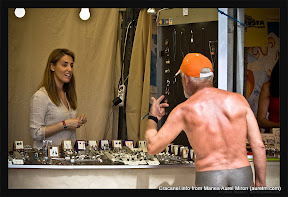
My first title was Ruminations on the nature of God, but very little of what follows belongs to me and I did not feel it’s right to constrain the meaning of the following works of art as such. I just took the pieces of a puzzle, translated them with Google, then pieced them together in what to me is a strangely coherent narrative. Obviously, copyrights belong to their respective owners and are acknowledged in sources.
ctp
Our first exhibit belongs to ctp and was published in 1987 in a collection of science-fiction stories of thunderous beauty. As a kid, I was forever changed by these stories, and even today, when I re-read them, they stimulate the centres of addiction in my burned-out brain..

To fully experience it, you might want to completely ignore my [comments] as well as my illustrations. I’m not sure how you can do this (perhaps reading it in an RSS reader)?
A very powerful image indeed.. Could it be the Pied Piper updated for the atomic age slightly older and with better tools of the trade? My illustration and comments notwithstanding (they were only added as connectors for the last poem), this is in my humble view one of the most endearing images of God created in sci-fi. Obviously, the old man is not necessarily God, he could simply be Destiny and the kangoch his hand, or Dãrâmaru (Ceausescu) or any other Dictator with architectural ambitions – or even Death with Scythe. Still, this imagery is present in many other works of art, such as below:
osborne
If you haven't already, you might want to watch the playlist.
| If God had a name, what would it be And yeah yeah God is great What if God was one of us If God had a face what would it look like And yeah yeah god is great yeah yeah god is good What if God was one of us And yeah yeah God is great yeah yeah God is good What if god was one of us | Daca Dumnezeu ar avea un nume, care ar fi Si mda, Dumnezeu este mare Ce-ar fi daca Dumnezeu e (a fost?) unul dintre noi Daca Dumnezeu are fata cum ar arata Si mda, Dumnezeu este mare Ce-ar fi daca Dumnezeu e unul dintre noi El încearca sa ajunga acasa Si mda, Dumnezeu este mare Ce-ar fi daca Dumnezeu e unul dintre noi |
Song trivia:
This was written by Eric Bazilian, who was working on the album with Rob Hyman and Rick Chertoff. Says Bazilian, "For me, the song was more about what happens to you when you look at something that has completely changed your world view, which could be meeting God, it could be meeting an alien, it could be a near-death experience, it could be anything like that. Just how everything you know is wrong, or everything you know is right, and you didn't know it."
Hyman and Bazilian were members of The Hooters and along with Chertoff, collaborated on Cyndi Lauper's first album, She's So Unusual. They usually take a while to craft their songs, but occasionally one will come out quickly. One of these songs was "All You Zombies," which was The Hooters' first single and also contains lots of Biblical imagery. Says Bazilian, "I've written a decent number of 'God' songs, and I wrote a bunch of them after 'One Of Us,' except you'll never hear them because they're not as good. It's a strange thing. I could, and I often have, pointed to another hand guiding."
Bazilian: "It was January, 1994. My now-wife had just moved over from Sweden. We were watching The Making of Sgt. Pepper on TV, and when it ended, she expressed interest in the 4-track recording process - that documentary is mostly George Martin sitting at the Abbey Road 4-track console. I pointed at the mass of wires sitting on my dining room table, which was my porta-studio, and said, 'There you go, that's 4-track recording technology for you.' She asked me to record something, and that's when it happened. I had been playing the guitar riff all day and put a little track together. She said, 'Sing it,' and I said, 'You can't just sing, you have to write the song, you have to discuss the concept, you have to re-write then decide you were better in the first place.' Something snapped - I just put the thing in record and started singing and that's what came out. The verses came out in the first pass, the chorus came out in the second pass. The next day I went in. We took a break later in the afternoon and I decided to play it for everybody. I had no agenda, I just said, 'Hey, check out this weird song I wrote last night.' I played the recording I'd done, and Rick Chertoff looked up and said, 'Joan, do you think you could sing that?' She said, 'Yeah,' so I wrote the words out and played on the guitar as she sang it, and that was it. That was our first rough demo of it."
Osborne got her record deal after Rob Hyman saw her perform and brought her to the attention of Rick Chertoff, who by then was a producer at Polygram Records. She released one previous album on her own before working with Chertoff, Hyman and Bazilian on Relish.
Osborne, Bazilian, Hyman and Chertoff were right in the middle of writing other songs for the album, like "Right Hand Man," "St. Teresa," and "Ladder" when Bazilian got the idea for this. Says Eric, "My girlfriend, now wife, had picked me up at a session at Rob's house that day. When she walked in, I was playing that guitar riff. Part of writing that song was a reaction to being deep in this 4-way songwriting collaboration, which can get very draining."
Bazilian: "In my case, it's not a religious thing, I'm not a religious person. My relationship with the absolute is very private and personal. I'm not trying to bring anybody around to any way of thinking. You don't write songs like that, they write you. When I write songs, I don't have any agenda. I often learn a lot about what I'm thinking about any given issue from the songs I write about it. There was no conscious decision to write a song with the "G" word in it, but it ended up sort of summing up my world view inadvertently, just by the words that happened to pour out of me at the time." (Thanks to Eric for speaking with us about this song. For more, check out www.ericbazilian.com)
This is the theme song to the CBS TV show Joan Of Arcadia, which is about a young girl who encounters God in the form of everyday people. The producers thought this song fit perfectly with the show.
This earned Grammy nominations for Song Of The Year, Record Of The Year and Best Female Pop Vocal. Osborne was also nominated for Best New Artist and Relish for album of the year. None of them won, with Seal's "Kiss From A Rose" beating it for Song and Record Of The Year, Alanis Morissette winning Best Album and Hootie & the Blowfish winning Best New Artist.
This has been used in several movies, including Austin Powers, Vanilla Sky and Bruce Almighty.
On the album, before the song begins, a snippet of the Gospel song "Heaven's Airplane" is played. (thanks, Patrick - Tallapoosa, GA)
Prince covered this on his 1996 3-disc Emancipation album, changing the line "Just a SLOB like one of us" to "Just a SLAVE like one of us" in reference to him not owning the rights to his music when with Warner Brothers, which he viewed as "Artistic Slavery." (thanks, Paul - London, England)
This being said, we’re finally getting to this article’s raison d’etre. I recently discovered the following photos on one of my cybertrips. As I was looking at the photos, the dignified beauty and hanging charisma of the exhibitionist, combined with the absurdity of the situation and the clarity and detail of the photos immediately brought to my mind Sorescu’s poem, followed shortly thereafter by Joan Osborne’s song and ctp’s introduction to his short story. Enjoy, and make sure you visit the original website found in Sources, below.
The Halberd by Marin Sorescu
 Crowding in the trolley,
Crowding in the trolley,
Big madhouse,
People with packages in their arms,
With microbes
And, as I’m sitting,
Behind me,
A Santa with a spade -
No one knows what he needs it for.
He’s holding its tail
like a guard at
The royal tent.
The old man’s as ancient as the universe,
He has a large mole on his right eye,
And to top it all up, his hand is shaking.
"He’s gonna drop his shovel on my head
-I think, to hell with him!"
He is otherwise a nice guy,
Polite,
Even talkative.
 He says: "Don’t worry, I’m holding
He says: "Don’t worry, I’m holding
this damn spade tightly."
But still, from time to time
he drops it: bop, bop, bop!
Three quarters of the passengers
have already been bombed.
The old timer keeps
dropping the shovel,
Cursing and apologizing.
"I’m weak, God damn it,
But don’t worry,
Please do not be alarmed,
The goddamn spade
 won’t fall again
won’t fall again
Now and forever.
Can’t you see
how tightly I’m holding it? "
And just then-flop!
The road is full of potholes,
Jerks are jerks.
And this driver
doesn’t even notice,
He works his shift
and couldn’t care less:
He carries passengers
dead or alive – same thing!
Otherwise I don’t get
why he never stops
At any station,
Why he takes no breaks,
We could then get rid
of this decrepit killer,
 Especially since, as I see,
Especially since, as I see,
he sort of liquidated every one,
and now he’s standing
right behind me
with his halberd --
“Driver, hey driver!"
But who can hear me?
The bus keeps going,
maybe his route is ‘til the very end.
Jerks redouble,
The old timer starts to talk to me,
He's becoming more and more polite
And we start discussing the weather.
Halebarda de Marin Sorescu

Inghesuiala in troleibuz,
Balamuc mare,
Oameni cu pachete in brate,
Cu microbi
Si, cum stau eu pe scaun,
In spatele meu,
Un mos cu o cazma-
Naiba stie la ce-i trebuie
s-o care acasa.
O tine de coada ca pe-o halebarda
La usa cortului imparatesc.
E batran mosul de cand lumea,
Are o pata mare pe ochiul drept,
Ii mai tremura si mana pe deasupra.
“Asta acum o sa-mi scape
cazmaua in cap-
Ma gandesc, lua-l-ar dracu!”
El e un mosulica simpatic de altfel,
 Politicos,
Politicos,
Vorbaret chiar.
Zice:” Nici o grija, tin cu strasnicie
de afurisita asta de cazma.”
Si cu toate astea,
din cand in cand o scapa:
poc, poc, poc!
Trei sferturi din pasageri
au fost deja bubuiti.
Mosul continua sa scape cazmaua,
S-o blesteme
si sa-si ceara scuze.
“Sunt neputincios, pacatele mele,
Dar n-aveti nici o grija,
Va rog frumos sa nu va alarmati,
Afurisita asta de cazma
n-o sa-mi mai scape
Acum si-n vecii vecilor.
Nu vedeti ce strans o tin?”
 Si tocmai atunci- pleosc!
Si tocmai atunci- pleosc!
Drumul e plin de gropi,
Hurducaturile sunt hurducaturi.
Si soferul asta nici nu observa,
El isi face cursa si ce sa-l intereseze:
Duce pasagerii vii
sau pasagerii morti- tot aia!
Altfel nu-mi explic
de ce nu opreste niciodata
In nici o statie,
De ce nu face o halta,
Am putea sa-l dam jos
pe criminalul asta ramolit,
 Mai ales ca, dupa cate observ,
Mai ales ca, dupa cate observ,
i-a cam lichidat pe toti,
si acum s-a protapit chiar in spatele meu
cu halebarda lui –
“Sofer, hei sofer!”
Dar te mai poate auzi cineva?
Autobuzul merge, poate
are plan sa mearga pana la capat.
Hurducaturile se intetesc,
Mosul a si intrat in vorba cu mine,
E din ce in ce mai politicos
Si incepem sa discutam despre vreme.
Please remember that everything shown above does not have a UNIQUE interpretation, though it could have an interpretation that’s unique to you. The poem has been discussed in an article about a gruesome crime, but that is, by no means, the sole interpretation. Let us not forget that Pied Piper’s flute is also a phallic object, much like the halberd.
Sources / More info: explicit-aurelM, wiki-1-of-us, song-facts-1-of-us, yt
Aici vei găsi ştiri inedite, articole hazoase, perspective originale in politică, societate, economie şi relaţii interumane. QUESTIONS (Intrebări)? We got Answers (Răspunsuri există)!










